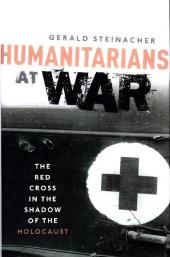 Neuerscheinungen 2017Stand: 2020-02-01 |
Schnellsuche
ISBN/Stichwort/Autor
|
Herderstraße 10
10625 Berlin
Tel.: 030 315 714 16
Fax 030 315 714 14
info@buchspektrum.de |

Gerald Steinacher
Humanitarians at War
The Red Cross in the Shadow of the Holocaust
2017. 352 S. 15 black & white illustrations. 241 mm
Verlag/Jahr: OXFORD UNIVERSITY PRESS 2017
ISBN: 0-19-870493-3 (0198704933)
Neue ISBN: 978-0-19-870493-5 (9780198704935)
Preis und Lieferzeit: Bitte klicken
How the International Committee of the Red Cross emerged triumphant from the dark days of World War II, escaping its ambiguous wartime record to re-affirm its leadership in world humanitarian affairs and help rewrite the rules of war in the Geneva Conventions
The Geneva-based International Committee of the Red Cross (ICRC) is one of the world´s oldest, most prominent, and revered aid organizations. But at the end of World War II things could not have looked more different. Under fire for its failure to speak out against the Holocaust or to extend substantial assistance to Jews trapped in Nazi camps across Europe, the ICRC desperately needed to salvage its reputation in order to remain relevant in the post-war world.
Indeed, the whole future of Switzerland´s humanitarian flagship looked to hang in the balance at this time.
Torn between defending Swiss neutrality and battling Communist critics in the early Cold War, the Red Cross leadership in Geneva emerged from the world war with a new commitment to protecting civilians caught in the crossfire of conflict. Yet they did so while interfering with Allied de-nazification efforts in Germany and elsewhere, and coming to the defence of former Nazis at the Nuremberg Trials. Not least, they provided the tools for many of Hitler´s former henchmen, notorious figures such
as Joseph Mengele and Adolf Eichmann, to slip out of Europe and escape prosecution - behaviour which did little to silence those critics in the Allied powers who unfavourably compared the ´shabby´ neutrality of the Swiss with the ´good neutrality´ of the Swedes, their eager rivals for leadership in
international humanitarian initiatives.
However, in spite of all this, by the end of the decade, the ICRC had emerged triumphant from its moment of existential crisis, navigating the new global order to reaffirm its leadership in world humanitarian affairs against the challenge of the Swedes, and playing a formative role in rewriting the rules of war in the Geneva Conventions of 1949. This uncompromising new history tells the remarkable and intriguing story of how the ICRC achieved this - successfully escaping the shadow of its
ambiguous wartime record to forge a new role and a new identity in the post-1945 world.
Humanitarians at War presents a compelling picture of how the policy of sovereign states and those of a private organization exerted a reciprocal influence on life-and-death decisions about humanitarian aid provision and international law. Kimberley A. Lowe, H-Net Reviews


